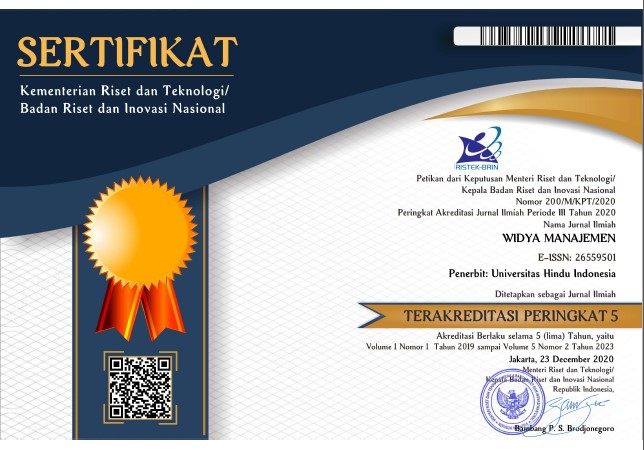Online Repurchase Intention: Empirical Study on The Fashion Market Shopee
Abstract
The appearance of the Covid-19 virus makes people feel anxious, when they want to leave the house, when they want to do activities or shopping for necessities. With the fast development of the internet which is used by entrepreneurs to sell their goods through e-commerce. People are starting to use e-commerce to fulfill their needs, such as shopee, Tokopedia, Lazada and other e-commerce sites. Shopee is the object of this research, because Shopee has the largest number of active users in Southeast Asia. In this study we will use a combination of quantitative and qualitative methods. This study aims to determine the effect of trust, satisfaction, confirmation, perceived ease of use, perceived enjoyment , perceived usefulness and past internet shopping experience by the intention to repurchase on Shopee. Types of data used in this study using primary data and interviews. The population used in this study has the characteristics of making purchases or transactions for 1 year at shopee. The sample technique in this study used non-probability sampling. The analytical tool used is the Structural Equation Model (SEM) using AMOS 22.0 software. The results obtained from this study indicate that there are 11 supported hypotheses and 4 unsupported hypotheses
References
Assegaff, S. (2015). Pengaruh Trust dan Online Shopping Experiences terhadap Perilaku Konsumen dalam Berbelanja Online: Perspektif Konsumen di Indonesia. Jurnal Aplikasi Manajemen, 13(3), 463-473.
Bilgihan, A., Kandampully, J., & Zhang, T. C. (2016). Towards a unified customer experience in online shopping environments. International Journal of Quality and Service Sciences. Doi: 10.1108/IJQSS-07-2015-0054
Cakici, A. C., Akgunduz, Y., & Yildirim, O. (2019). The impact of perceived price justice and satisfaction on loyalty: the mediating effect of revisit intention. Tourism Review. Doi: https://doi.org/10.1108/TR-02-2018-0025
Chen, Y. Y. (2012). Why do consumers go internet shopping again? Understanding the antecedents of repurchase intention. Journal of Organizational Computing and Electronic Commerce, 22(1), 38-63. https://doi.org/10.1080/10919392.2012.642234
Chen, L., & Aklikokou, A. K. (2020). Determinants of e-government adoption: testing the mediating effects of perceived usefulness and perceived ease of use. International Journal of Public Administration, 43(10), 850-865. https://doi.org/10.1080/01900692.2019.1660989
Chen, M.Y., & Ching, I.T. (2013). A comprehensive model of the effects of online store image on purchase intention in an e-commerce environment. Electronic Commerce Research, 13(1), 1-23. https://doi.org/10.1007/s10660-013-9104-5
Chen, S. Y. (2016). Green helpfulness or fun? Influences of green perceived value on the green loyalty of users and non-users of public bikes. Transport Policy, 47, 149-159. https://doi.org/10.1016/j.tranpol.2016.01.014
Chiu, C. M., Wang, E. T., Fang, Y. H., & Huang, H. Y. (2014). Understanding customers' repeat purchase intentions in B2C eâ€commerce: the roles of utilitarian value, hedonic value and perceived risk. Information Systems Journal, 24(1), 85-114. https://doi.org/10.1111/j.1365-2575.2012.00407.x
Geraldine, V., & Laurent, S. (2019). Online repurchase intention: Empirical study on the household equipment market. РоÑÑийÑкий журнал менеджмента, 17(4). https://doi.org/10.21638/spbu18.2019.409
Indarsin, T., & Ali, H. (2017). Attitude toward Using m-commerce: The analysis of perceived usefulness perceived ease of use, and perceived trust: Case study in Ikens Wholesale Trade, Jakarta–Indonesia. Saudi Journal of Business and Management Studies, 2(11), 995-1007.
Izogo, E. E., & Jayawardhena, C. (2018). Online shopping experience in an emerging e-retailing market. Journal of Research in Interactive Marketing.
Joshi, Y., & Rahman, Z. (2015). Factors affecting green purchase behaviour and future research directions. International Strategic management review, 3(1-2), 128-143. https://doi.org/10.1016/j.ism.2015.04.001
Lee, J. H., & Song, C. H. (2013). Effects of trust and perceived risk on user acceptance of a new technology service. Social Behavior and Personality: an international journal, 41(4), 587-597. https://doi.org/10.2224/sbp.2013.41.4.587
Liang, L. J., Choi, H. C., & Joppe, M. (2018). Exploring the relationship between satisfaction, trust and switching intention, repurchase intention in the context of Airbnb. International Journal of Hospitality Management, 69, 41-48. https://doi.org/10.1016/j.ijhm.2017.10.015
Liu, Y., & Tang, X. (2018). The effects of online trust-building mechanisms on trust and repurchase intentions. Information Technology & People. https://doi.org/10.1108/ITP-10-2016-0242
LUTFI, L. (2020). Pengaruh Kepercayaan Konsumen, Kehandalan, Dan Jaminan Terhadap Keputusan Pengguna Jasa (Studi pada KP JNE Mojoagung) (Doctoral dissertation, STIE PGRI Dewantara).
Mutahar, A. M., Daud, N. M., Thurasamy, R., Isaac, O., & Abdulsalam, R. (2018). The mediating of perceived usefulness and perceived ease of use: the case of mobile banking in Yemen. International Journal of Technology Diffusion (IJTD), 9(2), 21-40. Doi: 10.4018/IJTD.2018040102
Moses, P., Wong, S. L., Bakar, K. A., & Mahmud, R. (2013). Perceived usefulness and perceived ease of use: antecedents of attitude towards laptop use among science and mathematics teachers in Malaysia. The Asia-Pacific Education Researcher, 22(3), 293-299. Doi: 10.1007/s40299-012-0054-9
Oghuma, A. P., Chang, Y., Libaque-Saenz, C. F., Park, M. C., & Rho, J. J. (2015). Benefit-confirmation model for post-adoption behavior of mobile instant messaging applications: A comparative analysis of KakaoTalk and Joyn in Korea. Telecommunications Policy, 39(8), 658-677. https://doi.org/10.1016/j.telpol.2015.07.009
Oke, A. O., Kamolshotiros, P., Popoola, O. Y., Ajagbe, A. M., & Olujobi, J. O. (2016). Consumer behavior towards decision making and loyalty to particular brands. International Review of Management and Marketing, 6, 43-52.
Oktaviani, W. (2018). Pengaruh Kepercayaan dan Kepuasan Konsumen terhadap Loyalitas Konsumen dalam Menggunakan situs Traveloka. Universitas Darma Persada.
Pann. (2019, April 14). Confirmation – (Ekonomi / Bisnis). Retrieved from Glosarium Online: https://glosarium.org/arti-confirmation-di-ekonomi/
Rachmatunnisa. (2019). 10 Fakta Persaingan GoPay, Ovo, LinkAja, dan Dana cs. Retrieved October 17, 2019, from inet.detik.com website: https://inet.detik.com/business/d-4666061/10-fakta-persaingan-gopayovo-linkaja-dan-dana-cs
Rouibah, K., Lowry, P. B., & Hwang, Y. (2016). The effects of perceived enjoyment and perceived risks on trust formation and intentions to use online payment systems: New perspectives from an Arab country. Electronic Commerce Research and Applications, 19, 33-43. https://doi.org/10.1016/j.elerap.2016.07.001
Saleh, H. (2020). Pengaruh Nilai Yang Dirasakan Dan Kepercayaan Terhadap Niat Membeli Kembali Pada PT. Brodo Ganesha Indonesia Di Kota Bandung (Doctoral dissertation, Universitas Komputer Indonesia).
Sarkar, S., & Khare, A. (2019). Influence of expectation confirmation, network externalities, and flow on use of mobile shopping apps. International Journal of Human–Computer Interaction, 35(16), 1449-1460. https://doi.org/10.1080/10447318.2018.1540383
Seber, V. (2019). The Effect of Interaction Via Social Media and Past Online Shopping Experience on Repurchase Intention Through Trust in Tokopedia Application Users in Surabaya. Warmadewa Management and Business Journal (WMBJ), 1(2), 71-92.
Setyorini, R., & Nugraha, R. P. (2017). The effect of trust towards online repurchase intention with perceived usefulness as an intervening variable: A study on KASKUS marketplace customers. Jurnal Internasional, 9(1), 1-7.
Sugandini, D., Purwoko, P., Pambudi, A., Resmi, S., Reniati, R., Muafi, M., & Adhyka Kusumawati, R. (2018). The role of uncertainty, perceived ease of use, and perceived usefulness towards the technology adoption. International Journal of Civil Engineering and Technology (IJCIET), 9(4), 660-669.
Suhaily, L., & Soelasih, Y. (2017). What effects repurchase intention of online shopping. International Business Research, 10(12), 113-122. Doi: 10.5539/ibr.v10n12p113
Tawakal, D. I. (2016). Pengaruh Kualitas Layanan, Harga, Dan Kemudahan Terhadap Kepuasan Pelanggan Tri Di Surabaya. Jurnal Ilmu Manajemen (JIM), 4(1).
Trevinal, A. M., & Stenger, T. (2014). Toward a conceptualization of the online shopping experience. Journal of Retailing and Consumer Services, 21(3), 314-326.
Tseng, A. (2017). Why do online tourists need sellers' ratings? Exploration of the factors affecting regretful tourist e-satisfaction. Tourism Management, 59, 413-424. https://doi.org/10.1016/j.tourman.2016.08.017
Tyas, E. I., & Darma, E. S. (2017). Pengaruh Perceived Usefulness, Perceived Ease of Use, Perceived Enjoyment, dan Actual Usage Terhadap Penerimaan Teknologi Informasi: Studi Empiris Pada Karyawan Bagian Akuntansi dan Keuangan Baitul Maal Wa Tamwil Wilayah Daerah Istimewa Yogyakarta. Reviu Akuntansi Dan Bisnis Indonesia, 1(1), 25-35.
Utami, C. 2010. Manajemen ritel strategi dan implementasi operasional bisnis ritel modern di Indonesia. Jakarta: Salemba Empat.
Vos, A., Marinagi, C., Trivellas, P., Eberhagen, N., Skourlas, C., & Giannakopoulos, G. (2014). Risk reduction strategies in online shopping: E-trust perspective. Procedia-Social and Behavioral Sciences, 147, 418-423. Doi: : 10.1016/j.sbspro.2014.07.122
Wen, C., Prybutok, V. R., & Xu, C. (2011). An integrated model for customer online repurchase intention. Journal of Computer information systems, 52(1), 14-23.
Wicaksono, I. B. A., & Sukapto, P. (2021). Pengaruh online shopping experience produk fashion terhadap customer satisfaction dan repurchase intention. Forum Ekonomi, 23. http://dx.doi.org/10.29264/jfor.v23i1.8999
Reproduction Policy
Every author submitting articles to Widya Manajemen must make a statement that the manuscript is free from plagiarism and is not being considered and published in other journals.
Articles that have been published are copyrighted by the Program Studi Manajemen FEBP UNHI. For educational purposes, the contents of the article may be duplicated or reproduced as long as the source of the article is mentioned. Written requests must be submitted to the editor to obtain permission to republish the contents of the article for purposes other than educational purposes.
-----------------------------------------------------------------------------------------------------
Kebijakan Reproduksi
Setiap penulis yang menyerahkan artikel ke Widya Manajemen harus membuat surat pernyataan bahwa naskahnya bebas dari plagiarisme dan tidak sedang dipertimbangkan dan dimuat dalam jurnal lain.
Artikel yang telah dipublikasi menjadi hak cipta Program Studi Manajemen FEBP UNHI. Untuk tujuan edukatif, isi dari artikel dapat digandakan atau direpublikasi selama menyebutkan sumber dari artikel tersebut. Permintaan tertulis harus diajukan kepada editor untuk memperoleh ijin merepublikasi isi dari artikel untuk tujuan lainnya selain tujuan edukatif.






.jpg)









